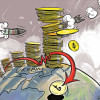Daunting time for fixed-income people as inflation bites

Mohammad Shabuj Sheikh has cut back on food expenditure, Shibly Ahmed has eliminated all non-essential purchases for his children, and a junior banker has let go of her domestic help.
Despite living in three different parts of the country, the three fixed-income people are fighting a common enemy: runaway inflation amid no adjustments in salaries.
They are among hundreds of thousands of people in Bangladesh who are facing an acute form of inflation as essentials are gradually going beyond their reach since the price increases have trumped their monthly salaries following the hike in fuel prices, the rising costs of basic commodities, transport fares, medical expenses and education expenditures.
According to state-run Trading Corporation of Bangladesh, the price of plain rice has increased by 12 per cent in the last one year, non-branded flour by 58 per cent, branded flour by 44 per cent, loose soybean oil by 37 per cent, bottled soybean by 33 per cent, lentils by 38 per cent, potato by 28 per cent, sugar by 17 per cent, and farm eggs by 32 per cent.
The transport fare has gone up twice in the last nine months -- first on November 5 and the second on August 6 – after the government revised upwards fuel prices to pass their higher international prices on to the public.
A surge in consumer price was reflected by higher food inflation, which stood at 8.19 per cent in July, slightly down from a multi-year high of 8.37 per cent a month ago. Non-food inflation rose six basis points to 6.39 per cent in the same month.
The fixed-income groups are particularly at far higher risk than other income groups as their salaries have not been revised in line with the rise in the cost of living.
Mohammad Shabuj Sheikh, a young man working as a security guard in Mirpur's Pallabi area, is buying less than necessary as the price of daily essentials has surged.
"I can't even afford the most important things right now. I'm eating less because my income has not increased," he said.
Shabuj's mother lives in Savar and he used to visit her twice a month. But since the two-way transport fare has gone up Tk 100 following last week's unprecedented increase in fuel costs, the 22-year-old has ditched plans to go on to visit her this month.
His plight does not end there.
Shabuj's wife is pregnant and the young couple hope to welcome their first baby in four months. His wife is now living with his grandparents in his village home in Magura.
He gets a salary of Tk 12,000 per month, with Tk 3,500 spent as house rent, Tk 2,500 for food and the remainder is sent to his wife. This leaves him with nothing to save.
"After a few months, our child will come to the world. I will need some more money for the baby. How will I manage it?" said Shabuj, with a sigh of relief.
Arif Hossain, a garment worker in Savar, has been the breadwinner of his four-member family since his father fell ill two years ago.
Since his incomes don't support the family's expenses, he has had to persuade his wife to join a garment factory as a worker so that she too can contribute to the family in this distressing situation.
Shibli Ahmed, a resident in Agargaon who works in a private company in the New Market area, has stopped riding rickshaws as the fare has doubled in a span of three months and is no longer readily willing to meet his daughter's demands for toys.
"I have also stopped going to social events for more than three months."
Zahirul Haque works for a non-government organisation in Madhabpur of Habiganj as a field worker earning Tk 10,000 a month.
The breadwinner of the three-member family, the 27-year-old says his financial condition has been worsening for the last one and a half months. As a result, he was forced to cut down on fish and meat consumption.
His family used to eat fish for 15 days a month and chicken meat once a month. Owing to higher prices, the family consumed fish only four times in July, and no meat was purchased in the month.
Rui, katla, climbing and tilapia fish are Tk 50-100 costlier per kilogramme compared to a year ago, whereas the broiler chicken price has gone up by 44 per cent.
Haque also has to support his septuagenarian parents, who have old-age complications.
"The cost of medicines has risen," he said.
"How long will I be able to meet the family expenses?" said Haque, adding that he has already borrowed Tk 7,500 to bear the family expenses.
The junior officer of a bank in Natore says the monthly kitchen market bills have gone up to Tk 4,500 from Tk 2,500 three months ago.
This prompted her to reduce fish and meat consumption and turn more to vegetables.
"We are not buying any clothing items unless absolutely necessary. There is no purchase of cosmetics. We had to let go of the temporary house help."
SM Nazer Hossain, vice-president of the Consumer Association of Bangladesh, said that people with a fixed income are facing a difficult reality.
Selim Raihan, a professor of economics at the University of Dhaka, says many fixed and low-income people are passing days in uncertainty since they don't know whether they would be able to meet family expenses next month.
Khondaker Golam Moazzem, research director of the Centre for Policy Dialogue, thinks inflation has made significant jumps three times recently, respectively after the pandemic recovery, the outbreak of the Ukraine war and the latest price hike of fuel oils.
As a result, the real earnings of fixed-income groups have fallen, but the decline is not fully captured by the government's inflation data, he said.
"So, people are eating less and cutting expenses. In the worst-case scenario, they might even compromise when it comes to nutrition intake."
The noted economist urged both public and private sector employers to implement the annual increment of salaries in advance so that the fixed-income groups can survive.


 For all latest news, follow The Daily Star's Google News channel.
For all latest news, follow The Daily Star's Google News channel. 




Comments